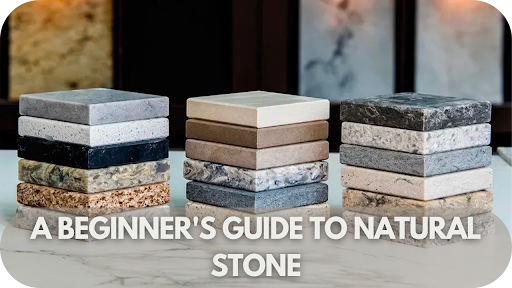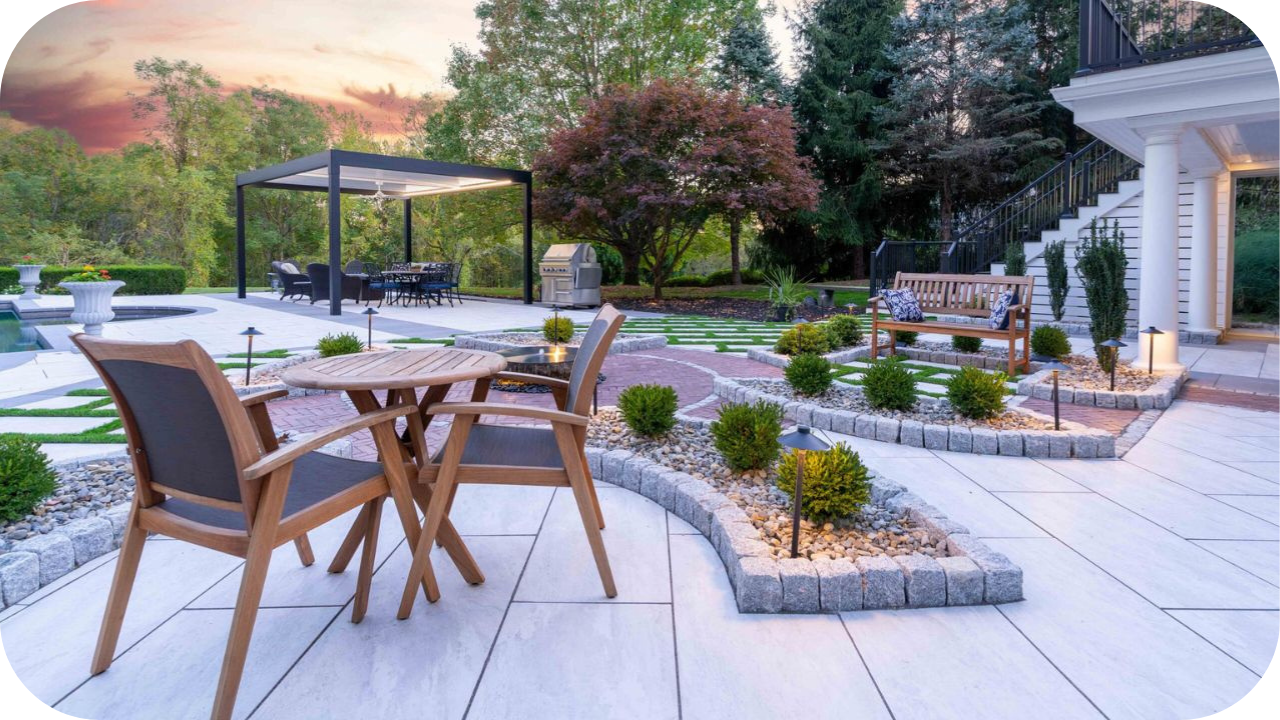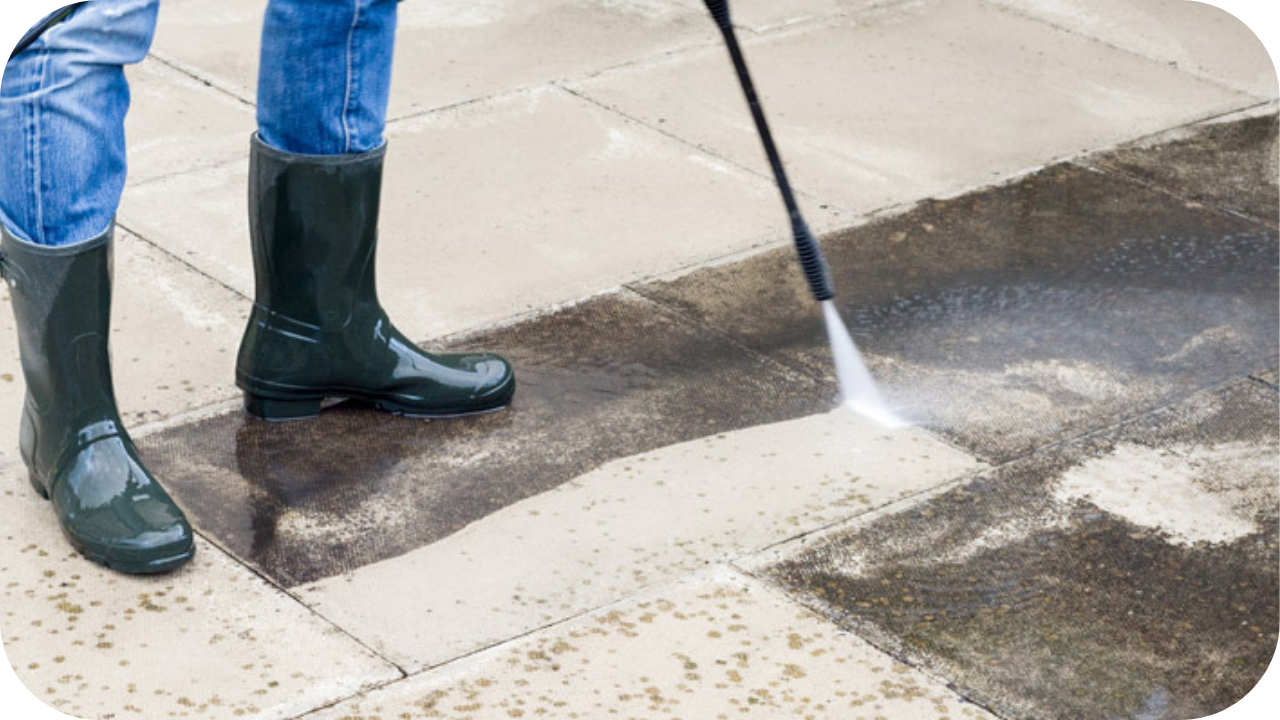
Natural stone brings unmatched beauty and durability to any space, but choosing a suitable material can be overwhelming.
From the elegance of marble to the strength of granite, each stone offers unique benefits. Before you make a purchase, it’s essential to understand the differences between the types of natural stone and how to select the best one for your project.
In this beginner’s guide, I’ll walk you through everything you need to know to make an informed decision and ensure your investment lasts.
What is Natural Stone?
Natural stone is a naturally occurring material formed over millions of years from minerals and organic compounds. It is extracted from quarries worldwide and includes types like granite, marble, limestone, sandstone, slate, and travertine.
Known for its durability, versatility, and timeless beauty, natural stone is a popular choice for construction, interior design, and landscaping.
Each piece of natural stone is unique, featuring distinct patterns, colours, and textures that add character and elegance to any space. Its applications range from flooring, countertops, and wall cladding to outdoor paving and garden features.
Natural stone is also valued for its eco-friendly properties. It is a sustainable material with minimal processing. Its natural strength and ability to withstand wear make it a durable choice, combining functionality with aesthetic appeal for modern and traditional designs.
Types of Natural Stone
Natural stone offers various options, each with unique characteristics and benefits. Whether you’re renovating your home or planning an outdoor project, understanding the different types of stone is key to making the right choice.
1. Granite
Granite is a highly durable stone, known for its scratch and heat resistance, making it perfect for high-traffic areas. Commonly used for countertops, flooring, and outdoor spaces, granite requires minimal maintenance and can withstand heavy use.
2. Marble
Marble is prized for its luxurious appearance, ideal for upscale applications like countertops, bathrooms, and fireplaces. However, it is delicate and prone to staining and etching from acids, requiring regular sealing and careful maintenance.
3. Limestone
Limestone is a soft, earthy stone often used for flooring, walls, and outdoor paving. Its natural texture adds charm, but it’s porous and needs sealing to protect against moisture, staining, and weathering, especially in outdoor settings.
4. Travertine
Travertine is a porous stone commonly used in outdoor spaces like patios and pool decks. Durable but requiring regular sealing, it protects against moisture and stains to ensure longevity in high-traffic areas.
5. Sandstone
With its rustic appeal, sandstone is perfect for outdoor paving, landscaping, and garden walls. Available in various colours, it complements many design styles. Sandstone requires regular sealing to protect it from weathering and stains, maintaining its beauty over time.
6. Quartzite
Quartzite is a tough, heat- and scratch-resistant material ideal for countertops and walls. Regular sealing maintains its durability, protecting it from potential stains and damage.
7. Porphyry
Porphyry, a volcanic stone with unique colour variations, is highly durable and weather-resistant. It’s ideal for paving, cladding, and landscaping, requiring minimal maintenance for long-lasting performance.
Benefits of Using Natural Stone
Natural stone offers a perfect blend of beauty, durability, and eco-friendliness, making it an ideal choice for any project. Here’s why natural stone stands out as the material of choice.
- Aesthetic Appeal: Natural stone offers unique textures, colours, and patterns that add a luxurious, sophisticated touch to any space. Its natural beauty provides a timeless look that enhances both modern and traditional designs.
- Durability and Longevity: Natural stone is highly resistant to wear, scratching, and weathering. This ensures that it retains its appearance and functionality for decades, making it an excellent long-term investment for both interiors and exteriors.
- Increase in Property Value: Natural stone significantly boosts property value by adding elegance, quality, and sophistication to homes. Its timeless appeal and luxurious finish make it a highly sought-after feature in the real estate market.
- Heat Resistance: Natural stone is naturally heat-resistant, ideal for areas exposed to high temperatures, such as kitchens, fireplaces, and outdoor spaces. It can withstand heat without warping, cracking, or losing its aesthetic appeal.
- Low Maintenance: Once sealed, natural stone surfaces are easy to care for with minimal maintenance. Regular cleaning and occasional resealing are usually enough to keep stone looking pristine and functioning well over time.
- Versatility: Natural stone can be used for various applications, from countertops to flooring, patios, and even landscaping. Its adaptability makes it suitable for both indoor and outdoor spaces with endless design possibilities.
How to Choose the Right Stone for Your Project
With so many stone options available, it’s essential to make an informed decision. By evaluating the stone’s intended use, style, durability, and maintenance needs, you can ensure a successful, long-lasting project.
1. Evaluate the Use
Choose a suitable stone based on its intended application. For high-traffic areas like kitchens, durable stones like granite and quartz are ideal, while softer stones like marble are better for decorative uses.
2. Consider Aesthetic Preferences
Choose the stone that aligns with your design vision. Pay attention to colour, texture, and finish, whether you prefer a polished, matte, or honed surface to complement your overall style.
3. Assess Durability
Evaluate the stone’s hardness and wear resistance to ensure it can handle the demands of the space. Stones like granite are durable and scratch-resistant, perfect for high-traffic areas and countertops.
4. Weigh Maintenance Requirements
Consider how much upkeep the stone will need. Some stones, like marble, may require more frequent sealing and cleaning, while others, like granite, are low-maintenance once properly sealed.
5. Determine the Budget
Set a realistic budget based on the type of stone you need. While materials like granite and quartz may be pricier, options like limestone and sandstone can offer more affordable alternatives without sacrificing quality.
How to Care for Natural Stone
Caring for natural stone ensures its beauty and longevity. Follow these simple steps to keep your stone surfaces looking pristine, protected, and as stunning as the day they were installed.
- Clean regularly: Use a mild, pH-balanced cleaner to avoid damage. Harsh chemicals can etch softer stones like marble. Clean spills promptly to prevent stains from setting in.
- Seal surfaces: Sealing protects the stone against stains and moisture. Granite needs resealing every 1-3 years, while porous stones like marble require more frequent sealing to maintain protection.
- Prevent damage: Use coasters, trivets, and cutting boards to protect the stone from scratches, heat, and stains. Place rugs or mats in high-traffic areas and avoid dragging heavy objects across the surface.
- Maintain long-term: Reseal and polish the stone periodically to keep it looking its best. In the case of severe stains or damage, professional restoration services can help maintain its durability and appearance.
- Avoid acidic substances: Avoid acidic cleaners or substances like vinegar or citrus juices, which can damage or etch stones like marble and limestone. Always use cleaners specifically designed for stone.
- Protect from extreme temperatures: Avoid sudden temperature changes to prevent thermal shock. Never place hot pots directly on stone surfaces; use trivets or hot pads to protect the stone.
Why Choose Splendour in Stone for Your Natural Stone Needs
Splendour in Stone offers a curated selection of high-quality natural stones, designed to meet the diverse needs of every project.
With decades of experience, the team at Splendour in Stone understands the nuances of stone selection, ensuring that customers receive not only the finest materials but also the right stone for their specific requirements.
The experts at Splendour in Stone are dedicated to guiding customers through every step of the process, whether it’s choosing stone for residential, landscaping, or commercial projects. The company works closely with trusted suppliers to source stones that are both visually stunning and built to last, from classic limestone to luxurious marble and durable granite.
What sets Splendour in Stone apart is their unwavering commitment to customer satisfaction. Offering personalised advice, reliable delivery, and expert support, the company ensures a seamless experience, making it the trusted choice for natural stone.
Common Mistakes to Avoid When Buying Natural Stone
Buying natural stone is an investment, and avoiding common mistakes can ensure you get the right material for your project. Here are some pitfalls to watch out for before making your purchase.
- Choosing the wrong stone type for the intended use: Not all natural stones are suitable for every application. For example, marble is beautiful but not ideal for high-traffic areas, while granite is more durable for countertops and floors.
- Not considering long-term maintenance needs: Some stones, like limestone and marble, require more maintenance than others. Failing to factor in sealing and cleaning requirements can lead to costly repairs and premature wear.
- Overlooking the importance of professional installation: Installing natural stone improperly can lead to damage, misalignment, or even structural issues. Hiring professionals for proper cutting, placement, and sealing is essential.
- Ignoring the stone’s porosity: Some natural stones, like marble and sandstone, are more porous than others. Without proper sealing, these stones are more prone to staining and damage from moisture, so it’s crucial to consider the stone’s porosity before purchasing.
- Focusing only on aesthetics: While appearance is important, choosing a stone that balances aesthetics and functionality is essential. Prioritising looks over durability can result in selecting a stone that is not practical for the intended application.
Conclusion
Choosing the right natural stone is key to creating a space that’s both beautiful and durable. Whether you’re updating your home or working on a larger project, understanding your options ensures a smart investment.
With the right knowledge, you can confidently select the perfect stone for your needs. Ready to explore your options? Visit Splendour in Stone today for expert advice, premium materials, and inspiration to bring your vision to life with natural stone.
More To Explore

Natural Stone Materials: Types, Benefits, and Choosing the Right Stone for Your Project
Natural stone is widely used in Australian homes because it offers lasting beauty, strength, and natural character in both indoor and outdoor spaces. Its variation

How to Maintain Limestone Pavers for Long Term Surface Quality
Limestone is a favourite choice for Australian outdoor spaces because its soft texture and natural warmth bring a relaxed, timeless feel to patios, pathways, and


